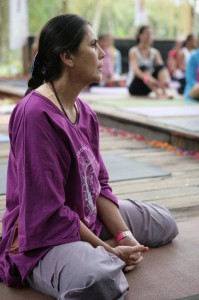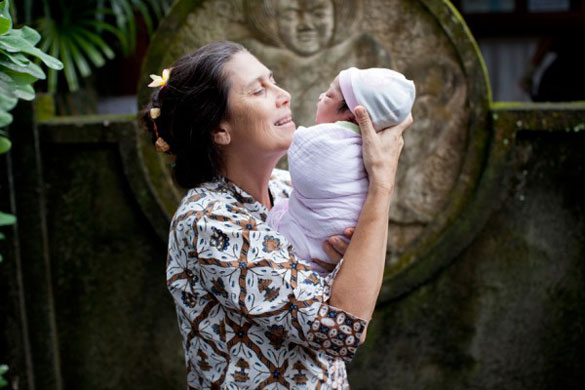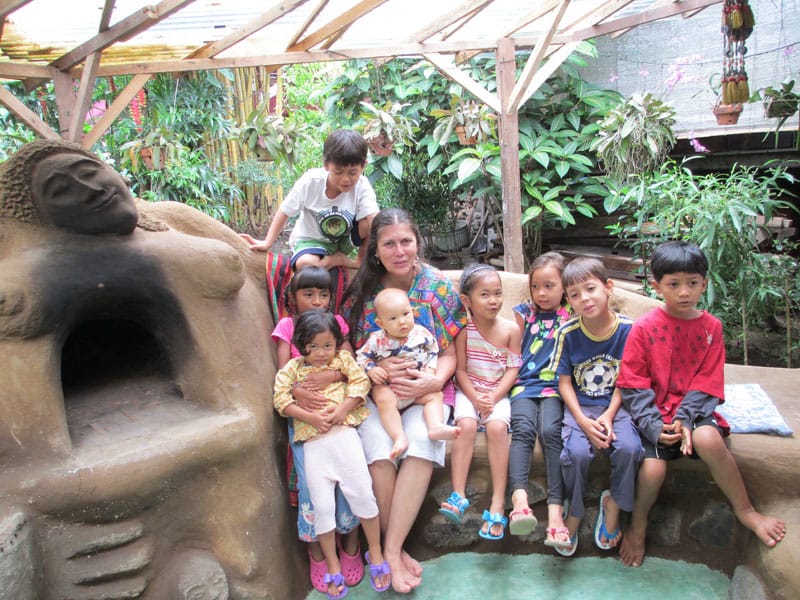Meet Robin Lim, also known as ‘Ibu Robin’
Founder and Executive Director of Yayasan Bumi Sehat [Healthy Mother Earth Foundation]. Robin was awarded the prestigious CNN Hero of the Year 2011, UNIFEM Singapore Committee Woman of the Month (December 2008), Mothers Naturally Award 2010, Birthkeeper Award 2012 and Alexander Langer International Peace Award 2006.
You are a wife and mother of eight, a grandmother, a midwife, a healer and an educator. You are also a published author. Is your novel ‘Butterfly People’ based on your personal history?
Butterfly People is based on six generations of my family in the Philippines, from the 1800’s until today. It is biographical fiction about love, family and tradition. It is about the simple joys in life which we all have in abundance. My grandmother, Hilot Vicenta Munar Lim was the village Hilot [healer] and baby-catcher.
You became a midwife after experiencing personal tragedies. What led you here to do the work you are doing?
The death of my sister and her baby due to complications during pregnancy as well as the loss of my best friend made me re-examine my life. My husband and I sold our home in Hawaii and moved our family to Bali. Once here I noticed that there was a need to address problems such as malnutrition, especially among pregnant women. The modified rice crops yield more harvest but the rice has less nutritional value. I started in a room over my kitchen, helping educate in pre-natal care and infant care. I delivered babies in people’s homes. Demand for my services grew in the expat community as well. I obtained formal midwife certification with the North American Registry of Midwives and Ikatan Bidan in Indonesia. In 2003 with the help of the Balinese community and midwives and donations from friends worldwide, the first Yayasan Bumi Sehat Clinic was opened.
You offer free pre-natal care, birthing services, medical aid, and educational and human services to over 50,000 people in need each year. You have clinics in Bali and Sumatra, but you have also brought maternal and infant care to devastated areas since 2004. What other disaster areas have you brought your skills to?
The tsunami of 2004 in Aceh, Sumatra was the first disaster area we went to, and we are still in Aceh. It is the largest catastrophe in our lives with over 400,000 deaths! The need there still remains great. All the first responders have left and our clinic there serves the medical needs of the people. I believe everyone has the right to gentle, natural, effective procedures and medicine. In 2006 the Rotary Club built a new clinic in Aceh for Bumi Sehat and it is all off the grid using solar power and other green technologies and is earthquake resistant. In 2006 we went to Jogjakarta to bring aid to the earthquake victims followed by Padang in 2008. We brought services to Haiti in 2010 following the destructive earthquake. Haiti was such a terrible disaster. There was a lack of medical supplies and doctors lacked instruments; they worked in tents. We teach how to safely cope with reproductive health issues in a disaster zone, and how to work without instruments such as burning the umbilical cord rather than clamping and cutting, which also mitigates the risk of infection.
What motivates you to create such positive change?
I believe in a benevolent hand that dreams this universe into existence. This hand moves for me when I trust in utter uncertainty. As a midwife, this is the humble place, the centre from which I work. It is my belief that original sin is birth trauma because it determines how we as a species impact our environment. Thus protecting children at birth will initiate a better world with the potential for healing change within one generation.
You practice a gentle birthing technique called Lotus or Wisdom birth and are an advocate of natural birthing such as protecting the placenta and the baby by not cutting the umbilical cord right after birth. Can you tell us about your new book: The Placenta the Forgotten Chakra?
 Your placenta is genetically identical to you. Your belly button is a souvenir reminder of your placenta. In many traditions such as in Bali it is believed the placenta or Ari-Ari is the physical body of a child’s guardian angel whose body, the placenta, dies after birth. The Angel’s spirit stays with the child for life. It is born alive as evidenced by the pulsing umbilical cord. Traditionally in Bali the placenta is wrapped in cloth and entombed within a coconut before being buried, usually to the right or left of the doorway, depending on the sex of the baby.
Your placenta is genetically identical to you. Your belly button is a souvenir reminder of your placenta. In many traditions such as in Bali it is believed the placenta or Ari-Ari is the physical body of a child’s guardian angel whose body, the placenta, dies after birth. The Angel’s spirit stays with the child for life. It is born alive as evidenced by the pulsing umbilical cord. Traditionally in Bali the placenta is wrapped in cloth and entombed within a coconut before being buried, usually to the right or left of the doorway, depending on the sex of the baby.
I believe the placenta is each person’s Tree of Life (Kayon in Indonesian). It is an archetypal symbol essential in Wayang Kulit [shadow puppet theatre]. The puppets represent form and the shadows represent soul. Modern culture simply disposes of the placenta as waste. This is the result of an ugly revolution in the 20th century – the industrialization of childbirth. Babies delivered from the mother, not by her. Babies are ‘rescued’ from the womb, the umbilical cord clamped and cut with no attention to the trauma of separating baby, mother and placenta. Medicine becomes divorced from nature. The placenta makes the act of creation possible and supplies stem cells, blood supply, and nutrients to the infant even after birth. In most medical settings they take the baby away at the most important time, blood flow and oxygen are cut off. Before the baby’s first breath, the infant feels death. Stillborn babies can sometimes be brought to life if the placenta remains attached by submerging it in warm water or massaging it. Ayurvedic medicine has recognized this for millenniums. The jeeva [life force] of the child is stored in the placenta and passed gradually after birth. Our connection to this life force was dismissed by the medical establishment, and only now being recognized by a more progressive medical establishment.
You are an advocate for parental rights. What is the biggest issue here in Indonesia?
When families fear they cannot take their new baby home from the hospital until they have paid the bill; it is a human rights issue. Some are forced to relinquish their babies for adoption. Unreported and largely preventable maternal and infant deaths occur regularly all over the world, where even average-income families cannot afford to use medical services, even when their lives depend upon getting the help they need.
You are an inspiration for us all. I know at least 80% of your patients cannot afford to pay for your services. Even the many expats Bumi Sehat has helped pay by donation. How can people support your cause?
Bumi Sehat needs help to keep operations open while beginning the work of building a new clinic in Ubud to accommodate the increasing medical needs in Bali. We know we can do it because of the loving partners we have here in Indonesia and worldwide. We have plenty of volunteers. Our current lease expires soon so we are pressured to complete the new clinic soon. We need additional resources to do this. Many people help us, in fact most of Bumi Sehat’s donors are giving small amounts, from their hearts, and every penny, every rupiah, is put to optimal use by our team.
You donated your CNN Hero Award to building this clinic. I know there are many people here who would love to support this important project. Thank you Ibu Robin!
Yayasan Bumi Sehat-Banjar Nyuh Kuning
PO Box 116, Bali – 80571
Indonesia
Website : www.bumisehatbali.org
Phone: 62-361-970002
Contact : Robin Lim or Eka Yuliani at info@bumisehat.org





